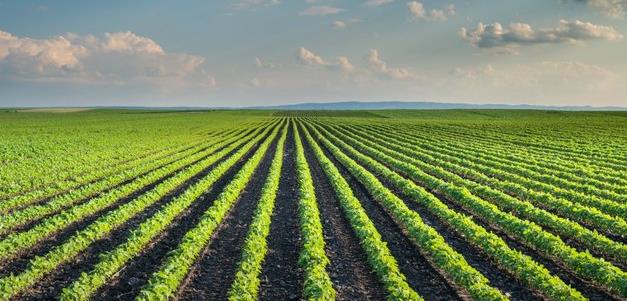Dicamba may not be banned in Arkansas during 2018 growing season
by December 13, 2017 6:21 am 505 views

Arkansas may not ban the herbicide dicamba during the 2018 growing season even after the recommendations of the Arkansas State Plant Board (ASPB) and a task force appointed to study the issue.
The Administrative Rules and Regulations Subcommittee of the Arkansas Legislative Council voted Tuesday to not recommend dicamba not be banned from April 15 through Oct. 31, 2018 as proposed by ASPB. The vote is not binding, and the final decision will be rendered by the ALC at a meeting Friday. ASPB Director Terry Walker told Talk Business & Politics he wasn’t sure what the ALC will decide and he wouldn’t make a prediction if dicamba will be banned next year.
“I have no way of knowing what will happen,” Walker said.
Sen. Bill Sample, R-Hot Springs, asked that the regulatory change be held until other options could be considered. Those options include the establishment of north and south use zones in the state, or changing the last application date to May or June, and that temperature restrictions could be a solution during the applications times. Dicamba becomes more volatile and drifts more frequently when temperatures rise above 68 degrees, according to researchers.
Some were not pleased with the decision.
Manila farmer David Wildy told committee members all of his soybean and peanut crops were impacted by dicamba drift this last growing season. He estimates he lost $350,000 from the damage caused. Two neighbor farmers admitted to Wildy that dicamba may have drifted from their farms onto his, but their insurance companies have refused to pay any compensation. His only other option is to sue, something he doesn’t want to do, he said.
“This issue is the worst issue I’ve seen in my 43 years of farming,” he said. “Who is going to stand good for my losses?”
Woodruff County farmer Perry Galloway was on the other end of the spectrum. Weeds are a constant problem on his farm, and dicamba has been effective, he said. He was one of the hundreds of farmers who signed a petition asking ASPB to reconsider. Those farmers account for 1.4 million farm acres in the state. A June 1 cutoff would work, he said.
Walker was uncertain what will happen if ALC doesn’t implement the regulation change. The 18 plant board members would have to convene and consider any new rule changes and if the changes are dramatic, the entire regulatory process would have to start over and it could take months, he said.
ASPB voted Nov. 8th to ban dicamba from April 16 through Oct. 31. The regulations include exemptions for the use of dicamba in pastures, rangeland, turf, ornamental, direct injection for forestry, and home use. At least 29,000 written comments were received in advance of that hearing and 37 people testified.
ASPB made the decision to ban dicamba after it received about 1,000 damage complaints, primarily in Northeast Arkansas, starting in May potentially caused from dicamba drift. The decision was highly controversial, but the board decided the risks were too significant in imposing the ban and steeper penalties for misuse. Dr. Mark Cochran, vice president-agriculture for the University of Arkansas System, said the decision was based on the best evidence available when it was made by ASPB in November.
“The plant board and the dicamba task force that preceded it made a decision based on the best evidence from land grant research conducted not only by the scientists of the University of Arkansas System Division of Agriculture, but also by their peers in Missouri, Tennessee, Indiana, and other states, and from additional information made available from all other sources. We are proud of the work that our weed scientists and agronomists have done in service to the people of Arkansas and beyond,” Cochran noted in a statement. “Our weed scientists and agronomists will continue to work diligently toward tools and techniques to help Arkansas farmers economically manage the challenge of resistant weeds.”
Dicamba has been banned in several states. Dicamba has been used as an herbicide for more than 50 years to manage 200 broad leaf weeds. It is a Weed Science Society of America Group 4 synthetic auxin – a plant hormone that causes plants to exhibit uncontrolled growth, according to the University of Arkansas. It is more volatile in warmer climates.
ASPB decided earlier this year to allow one formulation, Engenia dicamba, to be used in the state to fight pigweed, an aggressive weed that has plagued farmers in recent years. About 35% of the state’s 3.5 million soybean acres were planted with genetically-altered dicamba tolerant seeds. About 75% (300,000 acres) of the state’s cotton crop was planted with dicamba resistant seeds.
Scientists theorized dicamba was drifting into adjacent crop fields, gardens, and other places. Misapplications, weather conditions, or some other unknown factors may have caused the alleged drift. Tests proved the new formulations were less volatile than older ones, but there was still volatility, and it could last up to 36 hours after it was sprayed. Dicamba can attach to dust particles, meaning it can travel much further from target sites than previously thought.
Some additives enhanced the volatility. Ammonium sulfate and glufosinate increase the damage capabilities of dicamba. Researchers found damage could spread up to 220 feet away from an application site, nearly double the buffer distance the Environmental Protection Agency requires between dicamba and non-dicamba fields. Tests showed that if the wind blew in one direction for several hours, drift could cause damage on adjacent fields and then if the wind changed hours later, the same amount of damage would be caused there.
